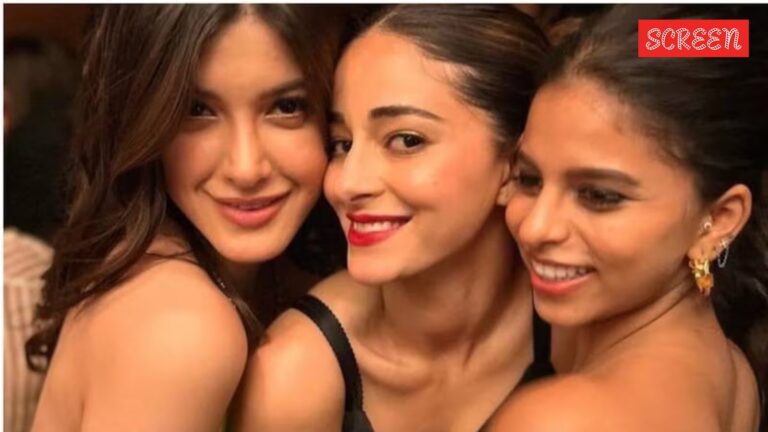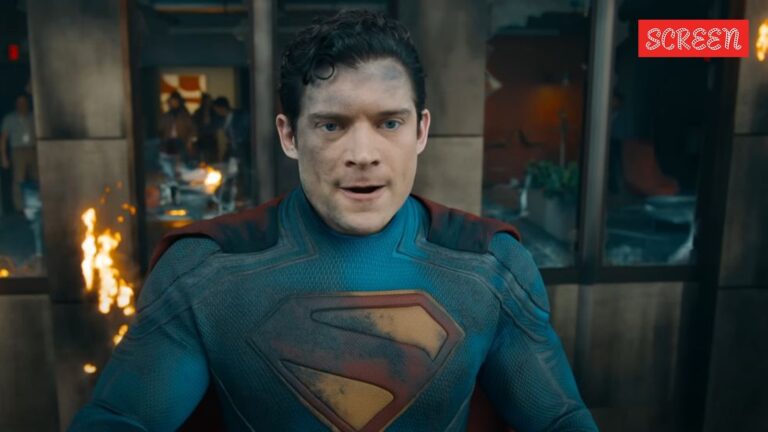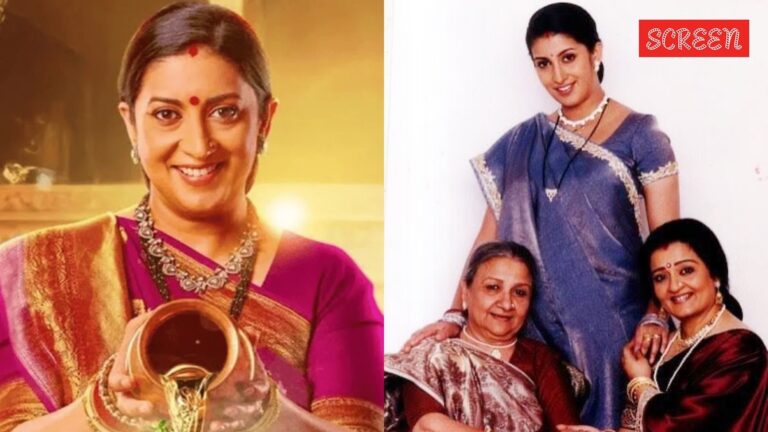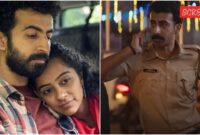Those who’ve seen Anurag Basu’s Metro… In Dino will vividly remember the tender, tangled story between Konkona Sen Sharma and Pankaj Tripathi. And if they remember that, they’ll likely remember a small but significant presence in their chapter, Rohan Gurbaxani, who plays Aaryan. Aaryan, who falls for Kajol (Sharma), even as her husband Monty (Tripathi) tries, perhaps too late, to win her back. It’s a small role, yes, but one that leaves an impression. And in Rohan’s five-year journey as an actor, it’s another step of a slowly growing, deeply personal journey. Whether it’s a blink-and-you-miss-it appearance in Karan Johar’s Rocky Aur Rani Kii Prem Kahaani, or more layered moments in shows like Made in Heaven 2 or Bandish Bandits 2, Rohan has been showing up, doing the work and holding space.
In an exclusive conversation with SCREEN, Rohan Gurbaxani opens up about working across styles and visions, with directors like Anurag Basu, Zoya Akhtar, and Karan Johar. He talks about the on-set energy of collaborating with Ananya Panday. And then there’s his Shah Rukh Khan story, one of those surreal, once-in-a-lifetime moments he says will stay with him, always.
Q: So what brought you into acting?
There wasn’t one defining moment, honestly. I started off with dance as a kid, like most kids do, I guess. I did some drama too when I was younger, just like everyone dabbling in dramatics at school. But it was only around fifth grade that something began to shift. My mom enrolled me in an acting class, and I started learning a bit more seriously. That’s when acting really began for me. But it still didn’t feel like some kind of big calling, like, “Oh my god, this is my passion!” I kept at it through school just because I enjoyed it. Then, around the end of high school, I had this thought: If I really want to try this acting thing, I need to go to New York and give it everything. I wanted to learn properly. Study it. Live it. People used to say, “Oh, you want to be an actor?” but I didn’t even know what that meant yet. I didn’t know what my path would be. I guess the first real moment of validation came when I got into NYU.
Q: So when you were at NYU, because I’m also from a film school background, we often start with acting but gradually find ourselves drawn toward other aspects too. Did you feel a similar pull toward directing, writing, or production?
Absolutely. I explored a lot while I was at NYU. I majored in acting, but every summer break, I made it a point to do something that would help me understand the process behind the camera as well. I worked on production sets, assisted directors, took up AV gigs, anything that gave me hands-on experience. One of my first internships was with director Ashwin Kumar, who I think was the first Indian director to be nominated for an Oscar in the short film category. I also worked at Excel Entertainment for a while as an intern when I was just 19 years old. That’s where I had this incredible opportunity to assist on a shoot featuring Shah Rukh Khan.
It was part of some shoot for Bollywood-themed attractions in an amusement park. The setup involved a green screen, and Shah Rukh sir had to perform on a raised platform. My job was to stand below with a silent fan to create wind and movement, it was such a surreal moment. Just watching him… the way he entered the room. He carries this aura, you know? Not because he’s trying to. He doesn’t demand attention, but he gets it. Even if you only catch the back of his head from across the room, you just know it’s him. That kind of humility and presence, it’s rare. And then there I was, barely 19, standing in front of him with this fan, helping create a moment of cinema. It was small, but for me, it was a massive moment.
Q: You’ve spoken a bit about working with Zoya and Karan. I find both of them fascinating in how they direct actors, very different, yet they share a deep understanding of emotion. What was it like to work with them so early in your career?
Story continues below this ad
Honestly, I’ve always admired both. Both Zoya and Karan have a very sharp sense of the human psyche. They understand people, how they feel, how they hide, how they break. And more importantly, they understand audiences. They know how to make emotional beats land, not just narratively, but viscerally. With Rocky Aur Rani, Karan was clearly trying to bring back a certain kind of family drama, that full-hearted, big-feelings kind of storytelling. And yet, he rooted it in something real. That’s not easy to pull off anymore, people try to revive older styles, but they don’t always work. Karan found a way to honour that legacy while modernizing it. Zoya, on the other hand, is more grounded in a different way. Made in Heaven has this raw, observational quality. It still feels stylized, but it’s rooted in emotional truth. Both of them are all about character. And that makes a huge difference. When a director puts character first, the story always feels lived-in.
Q: There’s this popular notion that Karan acts out the scenes for his actors. Did you see any of that on set?
No, not at all. At least, not in my case. He never performed a scene for me. But I think the best directors, and I’d include Karan in this, don’t need to perform the scene for you. They know how to communicate intention. Sometimes it’s just one word, a phrase, or even an analogy. The actor they’ve chosen needs to understand that and internalize it. The actor-director relationship shouldn’t be about mimicry. If a director performs the scene, and the actor just copies it, where’s the creativity in that? The director might as well have done the role themselves then, right? So I believe the actor’s job is to take inspiration from the director’s cues but then find your own truth in it. Because that truth already exists in the script. It’s there in the writing. Your job is to absorb that and translate it into performance. That’s what makes it yours.
Story continues below this ad
Q: A lot of people say that today, actors also need to be on Instagram, making reels, staying visible. Do you feel that pressure to be out there all the time?
I do struggle with that, to be honest. I see people around me doing it, posting regularly, staying active, and sometimes I wonder if I should be doing the same. But I’ve realised I look at social media a bit differently. I don’t see Instagram as this tool for virality. Of course, everyone wants their work to reach people, and going viral is always tempting. I’m not saying I wouldn’t want that. But I’d rather people discover me through my actual work, through the roles I play and the stories I’m part of. That said, I do enjoy sharing glimpses of my life and personality online, moments that maybe don’t come through in a performance. I want people to see the sides of me that aren’t visible in the characters I play. So in that sense, I do use social media, but more on my own terms.
I also know that today, casting decisions are influenced by all this. People say, “He’s got a following, maybe he’s an influencer,” and that does play a role in some cases. But I didn’t even have a thousand followers when I got my first break. So I do believe there’s still space for people who aren’t playing the numbers game, people who want to focus on craft. And I really respect the actors who are out there creating their own little projects, constantly putting stuff out that’s rooted in what they believe in. That takes a different kind of discipline. I’d love to do that too, something more long-form, cinematic, and meaningful. But attention spans are so short now… so even when I post, I try to bring some sort of narrative or intention to it.
Q: I know it’s a dated and over-asked question, but I’m still curious, how do you look at nepotism? Especially since you’ve now worked with some of the biggest production houses in the country.
Story continues below this ad
Yeah, it’s definitely been talked about to death, but I think it’s still important to look at it honestly. I didn’t personally face any roadblocks because of it, at least not directly. But I do think the landscape is shifting. The benchmark for performance has changed. Audiences have evolved. They want honesty, depth, and something that feels real. So whether you’re from a film family or not, you’re being judged by the same audience. That’s the great equalizer. In fact, I’d say the pressure on insiders is sometimes even higher now, because outsiders are raising the bar. There’s more competition, and that’s pushing everyone to do better. But nepotism, in some form, exists in every industry. Whether it’s restaurants or tech or film, there are always gatekeepers. But every now and then, someone from the outside comes in and changes the game. That’s the beauty of it.
As for my own experience, I’ve never felt a direct bias while working with big banners, YRF, Excel, Dharma. I think a lot of it also depends on how you carry yourself. If you walk in with a chip on your shoulder, thinking “they’re going to treat me differently,” then maybe you close yourself off from the experience. I try not to think of myself as less than or more than anyone else. We’re all teammates trying to make something together. That mindset has helped me stay grounded, especially when working with people from very different backgrounds.
Q: You also worked with Ananya Panday, who I thought was really good in Kho Gaye Hum Kahan. What was it like to work with her?
Ananya was great. From the first meeting itself, there was this clarity, some people have that. You just know the kind of person and collaborator they are, right away. And that’s really important. Because in acting, you can’t carry ego into a scene. If you’re collaborating with someone, you can’t be defensive, or guarded, or try to one-up each other. You have to let that go. Otherwise, it’s like two puzzle pieces refusing to fit together. The moment you drop that ego, that’s when the real exchange starts to happen, the energy, the give and take. That’s what acting is about. You have to receive what the other person is giving you, not just wait to say your lines. You have to meet them in that shared space of honesty. Ananya had that. She was present, warm, and open. The ice broke immediately, and we could just work together as two actors figuring out a scene, not thinking about hierarchy, or roles, or screen time. That kind of humility really makes a difference.
Story continues below this ad
Q: What was it like working with Anurag Basu? Everyone says he improvises a lot on set.
It was unbelievable. Honestly, I think doing Bandish Bandits prepared me for working with Dada, as Bandish had its own kind of creative looseness, so I had a taste of what that felt like. But Dada is something else. He’s this deeply instinctive, highly creative person. He’ll walk onto set, be inspired by something, and rewrite the scene right there. You’ll get the script in your vanity van, completely fresh. And it’s not just a few tweaks; sometimes it’s a whole new beat, a new emotional shift. That forces you to build a different kind of process. Whatever preparation or internal graph you had, sometimes you have to just toss it out. You have to surrender to the moment and trust your instincts. And that can be scary, but it’s also really freeing. What helped was that Dada was honest from the start. He said, “I know my process is different, but trust it, and we’ll make something beautiful together.” And that’s exactly what happened. It was chaotic in the best way. He’s someone who carries the film in his head, visually, emotionally, rhythmically. You just have to plug into that current.
Q: How was it to share space with legends like Pankaj Tripathi and Konkona Sen Sharma?
It was a masterclass. Pankaj sir has this ability to make everything feel effortless. You see him read a line and think, oh, that’s simple. But the moment he delivers it, it’s layered, sharp, completely lived-in. And Konkona ma’am was so present, open to trying new things, quick to respond in the moment. What really stood out was how generous both of them were. They weren’t trying to dominate the scene. They were collaborators. And that’s something I’ve always valued: the give-and-take of energy. That’s what creates memorable performances, not just skill. And then, of course, there was Dada, who was also the DOP for our segment. That was wild. He was literally holding the camera himself, composing the frame, adjusting the light, talking to us about intention, all at once. It was electric. The whole vibe was like, let’s discover this together. You weren’t just acting, you were absorbing, creating, reacting to things in real time. And that’s something you don’t always get on bigger sets.

























